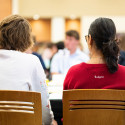Program brings Middle Eastern languages to life
This summer, campus learners included candy makers, bankers, teenaged musicians and visitors from around the world. Along the shores of Lake Mendota, one program taught its students about languages and cultures thousands of miles away.
This summer marked the sixth year of the Arabic, Persian and Turkish Immersion Program. The second year brought members of the military and foreign service, graduate students, language enthusiasts and others simply wishing to broaden their global horizons. The program has doubled in attendance since last year, up to more than 60 participants — almost entirely due to word of mouth.
As a leader in language instruction, UW–Madison offers more than 80 languages, with support from 11 area-studies centers, the National Council of Less Commonly Taught Languages and the National African Language Resource Center. APIP is the largest of four summer language programs and is the program offering the most intense immersion experience.
Students sign a contract that, for two months, limits their use of English to a brief window between Friday’s dinner and Saturday’s breakfast. Signs in the dorms reinforce this. The language instruction offers eight credits and a minimum of 180 hours of classroom contact, the equivalent of a full year’s study. This year, the program offered three levels of both Arabic and Persian and two levels of Turkish.
But for all its rigor, the program also offers more laid-back cultural activities that broaden the experience. Students and staff shared meals from local restaurants like the Casbah and danced Persian folk dances. Evening mini-courses — not so different from those offered at the Memorial Union — let students practice more artistic forms of calligraphy, among other arts.
The program began at Edgewood College, offering Arabic only. Before coming to UW–Madison last year, it found a temporary home at UW–La Crosse. Here in Madison, it benefits from the support of multiple departments, including Global Studies, International Studies, African Languages and Literature, Languages and Cultures of Asia, the Middle East Studies Program and the African Studies Program.
This year, UW–Madison became the only program in the country to offer a Turkish immersion program. In addition to the campus resources already available, assistance came from universities in the Eastern Consortium, including Columbia, Georgetown, Harvard, NYU, Ohio State, Princeton, Yale, Michigan and the University of Pennsylvania. The program is also one of only two Persian immersion programs in the country.
Students have many reasons for joining the program. One works in Qatar, while another simply loves languages. Though the war in Iraq remains in the minds of many, one former Marine attended because he wanted to pursue graduate eduacation in Arabic.
For graduate student Alexander Hanna, the program offered a chance to connect with his Egyptian heritage while providing a foundation for his academic work. Like many of his generation, he understood most conversations in Arabic but responded in English. But when he tried to join these conversations himself, he found the proper words beyond his reach.
“When I visited Egypt a few years ago, I found that my use of language improved immensely when I was forced to use Arabic to construct sentences and convey meaning,” says Hanna. “The immersion definitely allows me to communicate better with my family here and my family in Egypt.”
Immersion hasn’t been difficult for Hanna, though he wishes he could do more colloquial things such as conducting transactions or trying to find a cab. Still, he values the ability to stay on his home campus while adding everyday nuance to his communication.
Now working on his master’s thesis, Hanna plans to examine the use of online social media among secular and moderate political activists in Egypt. His growing ability to write and comprehend written Arabic will allow him to examine official documents and news outlets, providing context for the more colloquial language (“chat Arabic”) used online.
“Academically, I could do spoken Arabic, but my reading and writing skills were very limited,” says Hanna. “Those are key in my academic work. But now I can say, ‘No, I wouldn’t have known this word four weeks ago.’”
A live-in position with her APTIP students was a perfect fit for instructor Funda Derin. A native of Turkey, she is an associate lecturer of Turkish at UW–Madison during the school year. She is also an active participant in activities led by Madison’s Turkish community, coordinating the Turkish language table and presenting opportunities for students to interact with other Turkish people.
In a twist, Derin’s 9- and 10-year-old children, both born in Turkey, also lived with her in the dorms. Because they, too, spoke only Turkish, the students could see casual family interactions — a far cry from the formal language used in many classrooms.
“My students’ minds changed to Turkish very quickly,” says Derin. “They think in Turkish and produce language in Turkish very easily. Even if they have small mistakes, they stay in Turkish easily. I’m using Turkish with students more than I ever have before.”
She has particularly enjoyed the fun of being in Madison during the summer, joking with students during meals and outdoor activities. But for her, the payoff came when returning from a picnic with members of Madison’s Turkish community. Each of her students, quiet at first, became animated when talking about going to Turkey in the future.
“If they go to Turkey, live with Turkish people and say culturally appropriate sentences, Turkish people will feel close to them, not feel like they’re foreign anymore,” she says. “My people will feel that my students are one of them.”




